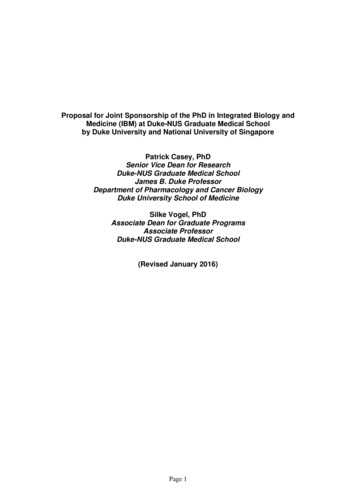
Transcription
Proposal for Joint Sponsorship of the PhD in Integrated Biology andMedicine (IBM) at Duke-NUS Graduate Medical Schoolby Duke University and National University of SingaporePatrick Casey, PhDSenior Vice Dean for ResearchDuke-NUS Graduate Medical SchoolJames B. Duke ProfessorDepartment of Pharmacology and Cancer BiologyDuke University School of MedicineSilke Vogel, PhDAssociate Dean for Graduate ProgramsAssociate ProfessorDuke-NUS Graduate Medical School(Revised January 2016)Page 1
Table of ContentsPageExecutive summary .3Background and rationale for a joint degree . 3Relationship to existing programs at Duke . 9Statement of resources needed for the program. . 14Students (sources, characteristics, opportunities available to students) .15The IBM graduate program organization . 18Degree requirements and curriculum . 20Description of new courses to be offered in connection with the program andidentification of teaching faculty. . 25Faculty who will participate in the program. . 25Long term sustainably of Duke faculty involvement and conforming with DukeGraduate School’s standards. . 27Support from the sponsoring schools and any additional clearance obtained orrequired .31Assessment of student learning outcomces .31List of TablesPageTable 1. Signature Research Program (SRP) at Duke-NUS GraduateMedical School in Singapore . 6Table 2. Overview of milestones in the IBM PhD Program . 7Table 3. Enrolled students in the IBM PhD Program at Duke-NUS andcomparison to Duke University metrics . 7Table 4. Faculty with Duke and Duke-NUS appointments (SRPs). . 10Table 5. Research collaborations funded Duke/Duke-NUS ResearchCollaboration Grants by the Duke/Duke-NUS Research Collaboration Grant . 12Table 6. Applicants and enrolled students to the IBM PhD Program at Duke-NUS . 16Table 7. Universities attended by students prior to joining IBM PhD Program .18Table 8. Chair and members of the Graduate Program Executive Committee. . 19Table 9. Chair and members of the PhD Admissions Committee. . 19Table 10. Academic Affairs Committee. . 20Table 11. Topic domains for ‘Molecules to Medicines’. . 21Table 12. Responsible Conduct of Research. . 22Table 13. Course offered in IBM PhD Program. . 25Table 14. Approved thesis mentors for the IBM Program. . 26Table 15. Oversight Committee for Duke-NUS IBM PhD Program. . 28Page 2
Executive SummaryThis proposal seeks the joint sponsorship and awarding of the PhD degree inIntegrated Biology and Medicine (IBM) at Duke-NUS by Duke University and NationalUniversity of Singapore. Duke-NUS is a graduate medical school and biomedicalresearch institution established by faculty of Duke School of Medicine and financed bythe government of Singapore. It is an academic component of NUS. Duke and NUSalready sponsor the very successful joint MD degree at Duke-NUS. We propose thatthe PhD degree be similarly jointly sponsored. The PhD degree program has alreadybeen in operation for five years, the first dozen students having graduated from NUS.The IBM student admissions metrics thus far are very similar to those of Duke PhDprograms overall, in terms of GRE, undergraduate GPA, English proficiency scores,prior research background, etc, though the applicant pool is primarily Singaporian andSoutheast Asian. The proposed program is closely modeled on Duke biomedical PhDprograms, and students will be held to the same requirements and standards as PhDstudents in Duke Graduate School. The parameters of the joint sponsorship will complywith the requirements of Duke’s SACS accreditors. Many faculty at Duke-NUS alsohave faculty appointments at Duke; additional measures are in place to ensure astrong, active and continual Duke presence in the research and curricular aspects ofthe program. Oversight will be provided by a committee composed of senior facultyadministrators of Duke Graduate School and School of Medicine, as well as NUS. Theprogram has no direct financial cost to Duke University, yet opens new researchavenues to Duke and strengthens Duke’s presence in Asia.Background and Rationale for Joint DegreeDuke-NUS is celebrating the 10-year anniversary of its founding, a time spanin which the school has grown into a successful and prominent center for biomedicalscience research and medical and graduate education in Asia.NUS is a high profile university, consistently recognized as one of the top threeuniversities in Asia and top 50 in the world. The joint venture initiated in 2005 betweenDuke University School of Medicine in partnership with the National University ofSingapore (NUS) resulted in the establishment of Duke-NUS Graduate Medical School.In 2009 Duke-NUS opened the doors of its new state-of-the art medical and graduateschool research building, built and financed by the government of Singapore. DukeNUS is solely owned and financed by the government of Singapore, and DukeUniversity has no financial commitments to Duke-NUS.The purpose of this application is to bring Duke-NUS’s graduate program inIntegrated Biology and Medicine (IBM), already sponsored by NUS, in greateralignment with Duke University’s graduate programs in biomedical sciences throughobtaining sponsorship of the IBM program by Duke University. This will result in thegranting of a joint PhD degree between NUS and Duke University for graduating IBMstudents.It is anticipated that the result of sponsorship by Duke University, along withthe continued sponsorship of NUS, will increase ongoing training and collaborativeopportunities for Duke-NUS, NUS and Duke University graduate students, faculty andother researchers. This in turn will leverage unique research expertise and facilitiesbetween the campuses, and enhance Duke University’s presence in Asia and NUS’spresence in the United States.We strongly believe that an important and necessary step toward achievingthese goals is to have a joint PhD program between Duke University and NUS. Asimilar joint degree (MD) already exists between Duke University Medical School andNUS at Duke-NUS Graduate Medical School for similar reasons. Aligning the PhDprogram in the same fashion is the next logical step in degree development at DukeNUS and in further synergizing the global strengths of both universities.Page 3
Duke-NUS grew into a leading research institution under the leadership ofProfessor Pat Casey, Senior Vice Dean of Research at Duke-NUS and James DukeProfessor of Pharmacology and Cancer Biology and of Biochemistry at DukeUniversity. From its inception in 2005, Professor Pat Casey brought to Duke-NUSDuke University’s high standards in medical and graduate education and a culture of“Dukeness”. The Duke University graduate research culture was transplanted to DukeNUS initially by recruitment of high-caliber tenure track research faculty from Duke.Subsequently, Duke-NUS expanded its recruitment to attract leading researchers fromother renowned universities and research centers. To date, a total of 88 regular rankfaculty have been recruited to Duke-NUS, attracting S 290 million (US 223 million)in competitive research funding from national and international sources. Over 2,000papers have been published from Duke-NUS faculty and their students in top peerreviewed journals such as Science, Nature, Cell, Nature Genetics, Nature Medicine,and PNAS. Our faculty have filed 51 international patents and initiated three clinicaltrails. These successes indicate that the quality of research and the researchenvironment at Duke-NUS are of very high caliber, similar to that of Duke University.Five world-class signature research programs (SRPs, equivalent to basicscience departments at Duke School of Medicine) were established with a focus ondiseases important to Singapore and Southeast Asia (Table 1, page 3). These areashave been chosen due to their relevance to major health burdens of Singapore andthe region, and to their alignment with major research interests of Duke faculty.The first dean of Duke-NUS was Professor Ranga Krishnan of Duke University.Like Professor Pat Casey, Dean Ranga, from the very beginning, instilled a sense ofDuke University’s culture to Duke-NUS that has been solidified over the last 10 years.Dean Ranga’s recent successor is Professor Tom Coffman, a renowned clinician andresearcher from Duke University, thus maintaining continuity of our programs withDuke University and its culture.Since the inception of the partnership between Duke and NUS in 2005, DukeNUS has made great progress toward building an internationally strong reputation forits biomedical research and innovative education. A joint degree between Duke andNUS for the IBM PhD program would be a recognition of this excellence, and anadditional reflection of the successful relationship between Duke University and NUS.Medical and Graduate Education at Duke-NUSThe goal for Duke-NUS was to establish a top-notch American style medicalschool in Singapore. The first cohort of medical students matriculated in 2007 and thusfar five classes of medical students have graduated. Our medical students graduatewith the Doctor of Medicine (MD) degree jointly awarded between Duke and NUS.Similar to Duke University, Duke-NUS strongly believes that having a strongPhD program in basic and biomedical sciences is instrumental in creating a researchdriven environment that is vital to training the next generation of scientists andphysician scientists. To achieve this goal, Duke-NUS aimed at starting the firstAmerican-style PhD research degree program in Singapore. The IBM PhD programwas approved by NUS in June 2009 (for implementation in AY2010/11). Followingapproval by NUS, the Duke-NUS program in Integrated Biology and Medicine (IBM)program was established as a rigorous, full-time PhD program with milestonescomparable to those established for PhD programs at Duke University and NUS. Thegoal is to provide a high-caliber training program for clinician-scientists and biomedicalPhDs to help meet the demand of developing and training scientists for Singapore’sgrowing biomedical sector.The first class of PhD students matriculated in 2010, and eleven of our studentsfrom this first cohort have successfully defended their dissertations. Duke-NUSmedical students also have the option to join the PhD Program after completion of theirfirst two years in medical school. Thus, the Duke-NUS program in Integrated Biologyand Medicine (IBM) trains MD/PhD as well as PhD students.Page 4
We strongly feel that formally aligning the IBM doctoral program with Duke Universitywould provide major advantages to training the best and brightest medical and PhDstudents in Singapore, and provide tangible benefits to both Duke University and NUS.A few key points on the benefits of a joint degree are summarized here. These will beexpanded on in the subsequent sections.Duke-NUS is a vibrant partnership between Duke and the National University ofSingapore (NUS). Since its inception 10 years ago, great accomplishments havebeen achieved. Duke-NUS education and research are top-notch and clearlygrounded in many of Duke’s principles. A joint medical doctor degree has beenawarded since the first graduating class in 2011. A joint degree for the PhDprogram would be the natural complement to the joint MD.The joint degree does not come with any financial cost to Duke University. Thegovernment of Singapore provides sufficient funding to Duke-NUS to support 75PhD students, i.e. allowing matriculation of a class of at least 15 each year withsupport for 5 years each. This joint degree would further help Duke solidify itspartner institution in Singapore as a major research hub for its outreach in Asiawith no financial burden.A joint degree will foster and provide additional opportunities for expandingresearch collaborations, student exchange programs and visiting fellowshipsbetween Duke and Singapore. This provides the Duke community with additional,high quality training and research opportunities in Asia, and similarly provides acontact point for NUS and Duke-NUS facuty and students in the United States.A joint degree will also enhance the talent pool attracted to Duke-NUS; in particular,US and Asian students may be more attracted to a joint degree program. This willalso benefit our faculty, and will strengthen our overall research and educationprogram. With a PhD program more closely linked to Duke through a joint degree,our students may subsequently be attracted to Duke for post-doctoral training, andour faculty more likely to turn to Duke for collaborations.In addition to IBM PhD students, numerous PhD students from graduate programsat NUS choose Duke-NUS faculty as their thesis mentors. These students, workingin research laboratories at Duke-NUS, will also benefit from the expandedcollaboration between Duke University and Duke-NUS. NUS students will haveadditional exposure to research collaborations and can take advantage of newexchange programs between the two campuses. One such recent program called“Pre-Doctoral and Post-doctoral Research Exchange Program: Duke and DukeNUS Medical School Singapore Collaborative Research Initiative” allows IBM andNUS students working at Duke-NUS to spend a month in a Duke University lab.Together this provides the NUS community with access to supplementary researchopportunities at Duke University and correspondingly provides the Dukecommunity with additional, high quality training and research opportunities at NUS.The doctoral degree at Duke-NUS is one of several PhD degrees offered by theNational University of Singapore (NUS). However, the quality of Duke-NUS andDuke’s graduate training are similar and more rigorous compared to PhD programsat NUS. Our training is based on US standards and in a research environment thatis similar in quality to Duke University. A joint degree would allow our program tobe more visibly distinguished relative to other programs in Singapore and Asia, inturn enhancing Duke-NUS’s talent pool.Page 5
Duke-NUS, as a Research hub in Asia for Duke, provides more opportunities forcollaboration in emerging research areas. The graduate program at Duke-NUS hasunique components that are not present at Duke University that Duke could benefitsignificantly from through collaboration. These new areas include the HealthServices and Systems Research Program as well as the Emerging InfectiousDisease Program.The goal is to increase ongoing training and collaborative opportunities for NUS,Duke-NUS and Duke University graduate students and professors, leverage on uniqueresearch expertise and facilities between the campuses, and enhance DukeUniversity’s presence in Southeast Asia.1. Rationale for a joint degreePhD program in Integrative Biology and Medicine (IBM) was established in 2010In 2000, the Singapore government launched the Biomedical SciencesInitiative aimed at making Singapore a biomedical research hub of Asia. At the sametime, the Ministry of Education recommended for Singapore to establish a graduatemedical school to educate highly trained physician-scientists needed to support theBiomedical Initiative. Two years later a Singapore delegation of leaders including theDeputy Prime Minister at the time, Dr. Tony Tan, visited Duke to discuss establishingsuch a school. The partnership between Duke and NUS was officially formalized in2005, and in 2007 the first cohort of medical students was admitted. At the same timeDuke-NUS recruited a high-caliber cadre of tenure track research faculty from Dukewhich would then lead to attracting other leading researchers from renown universitiesaround the world. Because Duke-NUS is a small school relative to NUS, it set out tofocus its research and graduate level training efforts into specific disease researchareas rather than traditional academic departments. This design resulted in theestablishment of five Signature Research Programs that gravitate around diseasesimportant to Singapore and Southeast Asia (Table 1).Table 1. Signature Research Programs (SRP) at Duke-NUS Graduate MedicalSchool in Singapore.Signature Research ProgramProgram DirectorCancer and Stem Cell Biology (CSCB)Prof David VirshupCardiovascular and Metabolic Disorders (CVMD)Prof Stuart CookEmerging Infectious Disease (EID)Prof Linfa WangHealth Services and Systems Research (HSSR)Prof David MatcherNeuroscience and Behavior Disorder (NBD)A/Prof Hongyan WangTo date a total of 88 regular rank faculty have been recruited into theseSignature Research Programs attracting S 290 million (US 223 million) incompetitive research money and publishing papers in peer-reviewed journals such asNature, Science, Cell, Nature Genetics, Nature Medicine, and PNAS.In 2010, the PhD program in Integrative Biology and Medicine (IBM) wasapproved by NUS and the Duke-NUS governing board with the aim to establish a highcaliber training program for physician-scientists and biomedical PhDs trained at DukeNUS. The first 11 students matriculated in 2010, and the program has now expandedto 49 students. The first ten students successfully defended their dissertations andhave graduated as of August 2015.As mentioned, the IBM program trains both PhD and MD/PhD students. MDstudents enter the PhD program following completion of the first two years in medicalschool. After completing the PhD degree, MD/PhD students return to finish the fourthyear of medical school, similar to the MSTP at Duke Medical School.Page 6
Currently, the IBM PhD degree is solely awarded by NUS. Duke-NUS stronglybelieves that awarding the joint PhD degree, as is done for the MD degree, will bemutually beneficial for both Duke University and NUS. Among the arguments for thisare these points:a) We have established a PhD program that is very similar in structure, studentqualifications and faculty excellence to the Duke PhD programs in basic medicalsciences. Expectations of student performance, milestones and accomplishments aresimilar to those in Duke biomedical sceicne doctoral programs (Table 2).TABLE 2: Overview of milestones in the IBM PhD programYear in programYear 1Year 2Years 3-5MilestonesCoursework; Start of Thesis ResearchCompleted coursework;Passing of PhD Qualifying Exam (PQE)Satisfactory research progress (evaluated byThesis Advisory Committee & OGS)Dissertation writing and successful defensePublication of first author research paperFurther, students recruited to the program have a comparable educational backgroundas students entering a doctoral program in biomedical sciences at Duke and similarmetrics to those admitted to PhD programs throughout Duke Graduate School (Table3).Table 3: Qualifications of enrolled students in the IBM PhD program at Duke-NUSand comparison to Duke University doctoral program metrics.Intake Year2010/112011/122012/13 2013/14 2014/15Enrolled (per year)119131413GRE13981380318318322(mean; 8)GPA(mean; range)3.63.83.63.63.6(3.1-3.8)(3.2-4.0)(3.2-3.9) (3.0-3.9) (3.1-4.0)Duke University (all PhD programs)GRE (mean)13371346320322322GPA (mean)3.73.73.73.73.7Importantly, the quality of the faculty at Duke-NUS is considered comparable to Dukefaculty, and they are promoted and hired based on Duke standards (appendix for CVsof faculty in section 7). Furthermore, many of the faculty at Duke-NUS hold jointappointments at Duke (Table 4)b) Our goal for the PhD program is to remain a rigorous, high-quality training programclosely aligned with both Duke and NUS. To carry this out, we are developing anoversight committee composed of senior academic admistrators and faculty membersfrom NUS and Duke University (see page 26). The oversight committee with becharged with formal review of the program at set intervals and will also receive regularupdates from the IBM program. In addition, the IBM has appointed a Duke facultyliaison who is active both at Duke and Duke-NUS to help ensure that Duke standardsare understood and employed. Prof Soman Abraham, who is currently the Director ofGraduate Studies in Pathology at Duke and is an researcher in the Emerging InfectiousPage 7
Disease program at Duke-NUS, will provide advice to the IBM program’sadministration on continual improvements to the IBM graduate program. Prof Abrahamwill also serve on the oversight committee. Hence, Duke University together with NUSwill be given a supervisory role of the Duke-NUS PhD program to ensure continuedquality and alignment of the IBM program with Duke. Overall, regular review of thePhD program by Duke and NUS and the involvement of Professor Abraham, providesdirect oversight of the PhD program, further contributing to strengthening therelationship between the two campuses.c) The joint degree with Duke will enhance the recognition and visibility of the IBM PhDprogram. A raised profile of the IBM PhD program will in turn benefit studentrecruitment. The IBM program already attracts exceptional students, but a joint degreeis expected to increase the application pool of talented students, in particular from theUSA and parts of Asia. With a PhD program more closely linked to Duke, thesetalented students may consequently be attracted to Duke for post-doctoral training.Along similar lines, having exchange of students and postdoctoral research fellowsbetween Duke and Duke-NUS can lead to new research collaborations between thetwo campuses.d) Establishment of a joint PhD program will strengthen the presence of Duke graduateeducation and biomedical research in Asia without financial cost to Duke University. Ajoint PhD program with Duke will distinguish the PhD degree from the regional PhDdegrees, thus enhancing the recruitment of many talented students in Asia, Europeand the USA.e) The joint degree will further strengthen the bonds between the research and trainingprograms at Duke and Duke-NUS. It is expected that more Duke faculty will activelyparticipate in thesis advisory committees of IBM PhD students and consequentlybecome more involved in the research projects at Duke-NUS. This can lead to newopportunities for research collaborations between Duke and Duke-NUS faculty andtheir students. As described in section 2, several programs are already in place tofoster the collaboration between Duke and Duke-NUS, which are fully financed byDuke-NUS. One of the newer programs that the IBM program is currently developingis an exchange program for graduate students between Duke and Duke-NUS that willalso be fully financed by Duke-NUS. Students from either program can spend time atthe ‘other’ campus with the goal to engage in collaborative research. A joint degreeprogram would further foster this program and may lower the barrier for Duke studentsto visit Duke-NUS and vice versa.f) The IBM program provides new, uniquely attractive research opportunities for Duke.One of the five signature research programs is “Health Services and SystemsResearch (HSSR)”, which focuses on organization, funding, and delivery of healthservices and employs systems perspectives to address critical health care issues. Thisinvolves the study of the structure, funding, and organization of existing health servicesand to provide research based, cost effective solutions to prevent or diminish healthcare burden. The scope of the program spans studying the economics of healthbehavior, evaluations of health promotion programs, research on policyimplementation, and health care systems for an aging population. The HSSR group,lead by Prof David Matcher, who came to Duke-NUS from Duke University, iscomposed of leading researchers in their fields producing high quality studies on topicsin Asia and globally. The research outcomes from the HSSR group have already hadsignificant impact and are shaping policy-making in the health sector in Singapore.With many similar health care and health system problems in the US, this providesDuke faculty with unique opportunities to collaborate with Duke-NUS on these topics.This may consequently contribute substantively to the discussion in the US aroundPage 8
health care systems. This is a unique research program without a comparableresearch group or institute at Duke University, and one of a kind in Asia. Hence, this isan attractive opportunity for Duke faculty and students to engage in novel researchquestions pertaining to health economics, health care and health services.Another unique program that does not have an equivalent at Duke is the signatureresearch program in ”Emerging Infectious Diseases (EID).” EID focuses on identifyingnovel treatments and vaccines for infectious diseases specific to South East Asia andof a concern to the US (e.g. Dengue, hepatitis B, influenza, SARs), with severalresearch groups working on developing effective vaccines and therapies, which haveresulted in recently published papers in the journal Science and initiation of clinicaltrials in Singapore. Several students from Duke have already spent a researchsemester in the EID research laboratories Duke-NUS, because similar resources andresearch opportunities are not present at Duke. Again, a joint degree would furtherincrease the current synergy between Duke and Duke-NUS and foster additionalexchanges.g) In contrast to other global initiatives for graduate education by Duke, Duke-NUSfaculty, staff and students, as well as the facilities and curricular resources are solelyfunded by local sources; in this case, all necessary funding is from the government ofSingapore. Therefore, there is no direct financial liability to Duke University. Theresearch and education building with top-flight laboratories and facilities opened in2009. High quality research laboratories occupy five stories of the Duke-NUS building,with an additional annex completed in November 2014 that hosts a new functional MRIfacility for clinical research.h) Singapore has a stable, transparent, democratic government and open multi-culturalEnglish-speaking society, and continues to be a strong ally of the US. Singaporecontinues to invest considerable sums of money into innovative biomedical educationand research initiatives. By investing in Duke-NUS, Singapore has demonstrated anenormous commitment toward furthering the Duke name and reputation. A joint PhDdegree with Duke and NUS would reciprocate that commitment by Duke University inline with the joint MD.i) The National University of Singapore (NUS) is a high profile university, consistentlyrecognized as one of the top three universities in Asia and top 50 in the world. NUS isalready the partner of Duke for the medical degree at Duke-NUS. In addition, NUS’sprestige has attracted the attention of other world-class universities, including ImperialCollege London and Australian National University, with which NUS has establishedjoint graduate degree programs. A joint degree between Duke and Duke-NUS is anatural complement to the existing joint medical degree and a reflection of the close,successful relationship between Duke and Duke-NUS.2. Relationship to existing programs at Duke2.1. Collaboration on IBM PhD curriculum review and teaching activitiesThe IBM PhD is now in its fifth year, and 11 students, including two MD/PhD students,have so far graduated from the program. Details on student characteristics andprogram structure are listed under section 4 below.With the awarding of a joint degree, Duke and NUS will both have a supervisory rolein evaluating the curriculum and administration of the IBM PhD program at regularintervals (see oversight committee, page 28). This will provide an opportunity to remainaligned with the rigor of the Duke and NUS PhD programs and to gain advice onimprovements. Similarly, it will provide opportunities to identify further collaboration onPage 9
the IBM program between Duke and Duke-NUS. With Professor Soman Abraham asthe faculty liaison, with faculty appointments and active research groups at both Dukeand Duke-NUS, this dialogue will be further and continually enhanced.An important point from the Duke perspective is that SACS accreditors must besatisfied that Duke has a sufficient role in the program to merit degree sponsorship. Inaddition to the direct oversight by Duke faculty as discussed above, approximately athird of the course curriculum will be provided by Duke faculty (consistent with SACSexpectations). For example, we are currently integrating recorded lectures given atDuke by Duke faculty in the medical school first year course sequence into the firstsemester Duke-NUS foundational course ‘Molecules to Medicines’. Students will viewthe lectures in advance and then discuss them in class, in the context of primaryresearch papers, with other students and Duke-NUS faculty. Following completion ofthis “flipped” course, our students take courses specific to the Signature ResearchProgram (SRP) in which they work. The course directors in the IBM curriculum areprimarily Duke-NUS faculty and many have joint appointments at Duke University(Table 4).Duke-NUS is offering
Duke University School of Medicine in partnership with the National University of Singapore (NUS) resulted in the establishment of Duke-NUS Graduate Medical School. In 2009 Duke-NUS opened the doors of its new state-of-the art medical and graduate school research building, built and financed by the government of Singapore. Duke-











